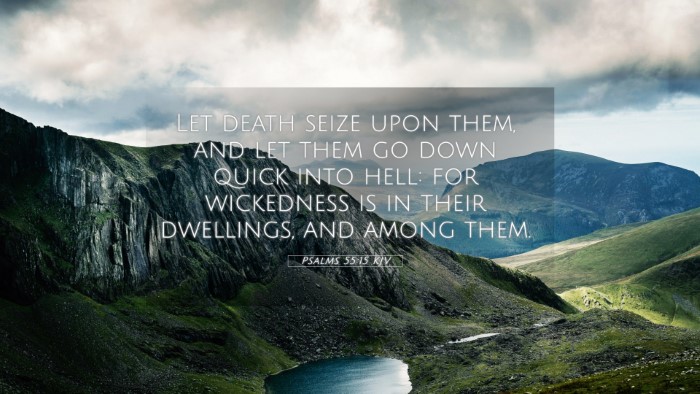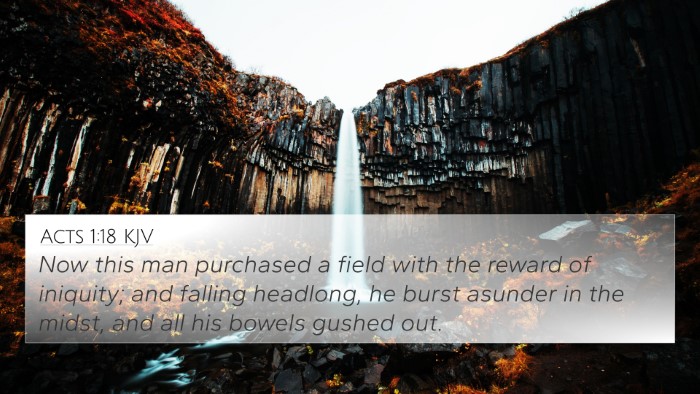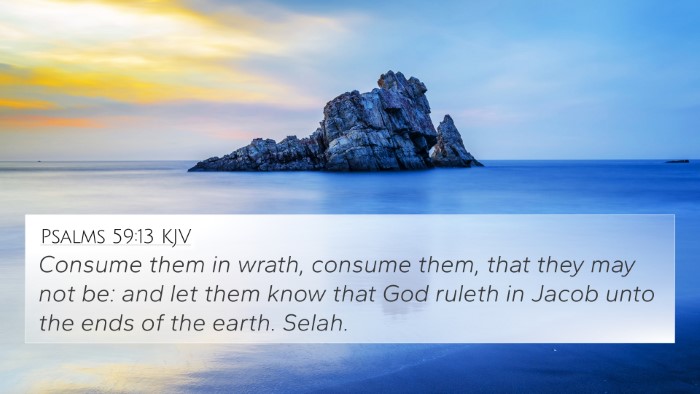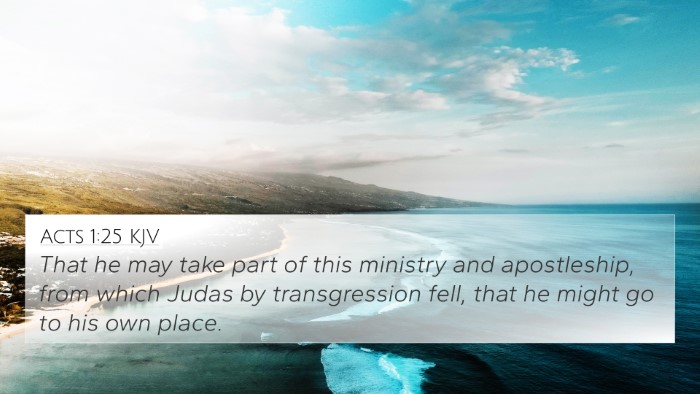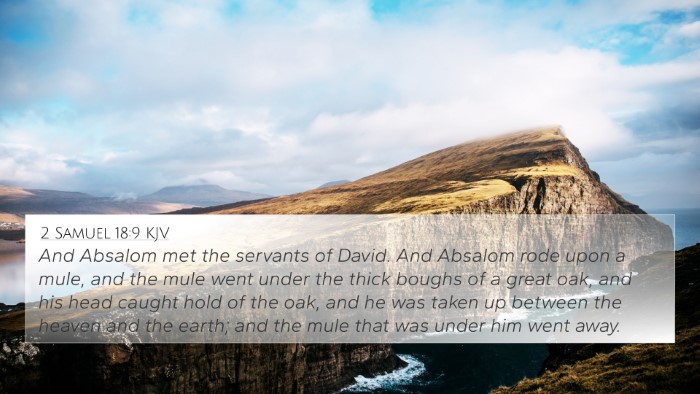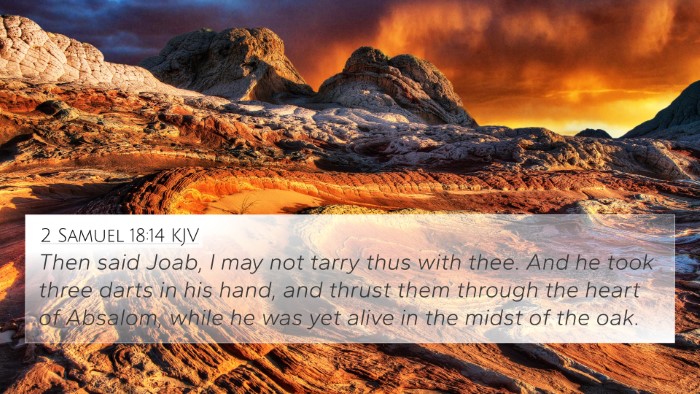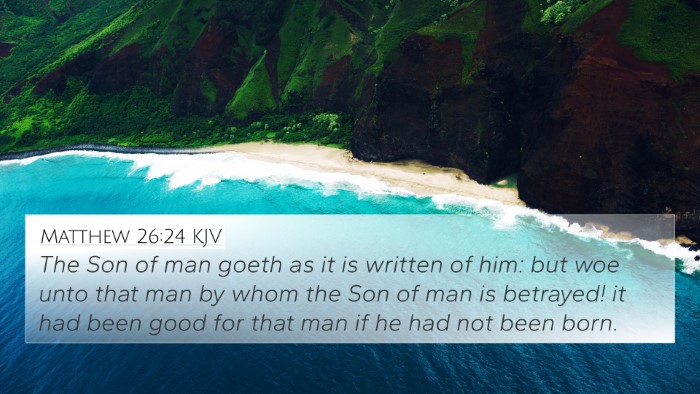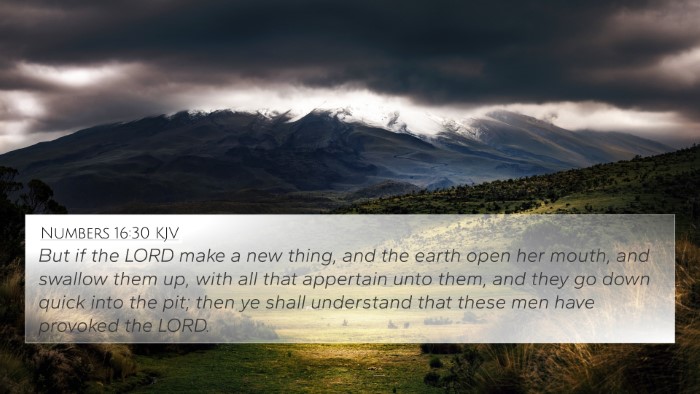Psalms 55:15 - Summary and Interpretation
Bible Verse: Psalms 55:15
This verse expresses a deep sorrow and plea against treachery and betrayal. The psalmist is speaking out against those who have turned against him, wishing for their demise due to their actions.
Meaning and Insights from Commentaries
The verse reads, "Let death seize upon them, and let them go down quick into hell: for wickedness is in their dwellings, and among them." Commentators such as Matthew Henry, Albert Barnes, and Adam Clarke provide valuable insights into its deeper significance.
-
Matthew Henry: He notes the intensity of the psalmist's emotions, indicating how deeply betrayal affects one’s soul. The desire for divine justice is evident here, representing the natural response of the heart when wronged by friends or allies.
-
Albert Barnes: He emphasizes that the psalmist calls for swift justice against the wicked. Barnes interprets "let them go down quick into hell" as a plea for immediate punishment for their treachery, underscoring the moral order that should govern human actions.
-
Adam Clarke: Clarke interprets the verse as a metaphorical expression of indignation and a plea for the isolation of those who practice wickedness. He offers a broader perspective indicating the inevitability of retribution for those who engage in iniquity.
Bible Verse Cross-References
This verse can be cross-referenced with several other scriptures that speak to similar themes of treachery, justice, and divine retribution. Here are some related verses:
- Psalm 109:17-18: This verse expresses similar sentiments, wishing adverse consequences upon the wicked.
- Proverbs 11:21: "Though hand join in hand, the wicked shall not be unpunished." This emphasizes the certainty of justice for the wicked.
- Matthew 7:2: "For with what judgment ye judge, ye shall be judged." This provides the moral principle of reciprocity in judgment.
- Revelation 21:8: Lists categories of sinners doomed to the lake of fire, tying in themes of eternal consequences for wickedness.
- 2 Thessalonians 1:6: Speaking of God's justice, indicating that He will repay those who commit evil acts.
- Galatians 6:7: "For whatsoever a man soweth, that shall he also reap," accentuating the concept of divine justice over time.
- Psalm 73:18-20: This reflects on the apparent prosperity of the wicked but concludes with the inevitable downfall.
- Isaiah 3:11: "Woe unto the wicked! It shall be ill with him..." affirming that the fate of the wicked is destruction.
- Romans 12:19: "Vengeance is mine; I will repay, saith the Lord," indicating God’s role as the avenger of wrongs.
- Jeremiah 11:20: The Lord's knowledge of the treachery of wicked men aligns with the themes of divine awareness and judgment.
Understanding the Thematic Connections
The thematic connections in Psalms 55:15 resonate throughout the scripture, linking back to the concepts of divine justice and the consequences of betrayal. Through cross-referencing biblical texts, we uncover how recurrent motifs speak to the nature of human betrayal, the call for justice, and the integrity of God’s judgment.
Tools for Bible Cross-Referencing
Utilizing tools for Bible cross-referencing can enhance understanding, particularly when studying connections between Bible verses. Here are a few suggested methods:
- Bible Concordance: An essential resource that helps identify where specific words appear throughout the Bible.
- Bible Cross-Reference Guide: This can provide insights into thematic and topical connections between verses.
- Cross-Reference Bible Study Methods: Incorporating systematic approaches that look at multiple verses can enhance biblical understanding.
- Comprehensive Bible Cross-Reference Materials: Access to various cross-reference books or tools online can facilitate deeper explorations.
Conclusion: Interpreting Biblical Themes through Cross-References
Psalms 55:15 serves as a profound reminder of the emotional vents associated with betrayal and the call for divine justice. The insights drawn from notable theologians alongside the interconnectedness of scripture provide a comprehensive understanding of the verse. Utilizing cross-references enriches one’s interpretation of not only this verse but others that discuss justice and wickedness. Engaging deeply with Biblical texts allows for a holistic view of divine retribution and the moral fabric that God has woven into human experience.

